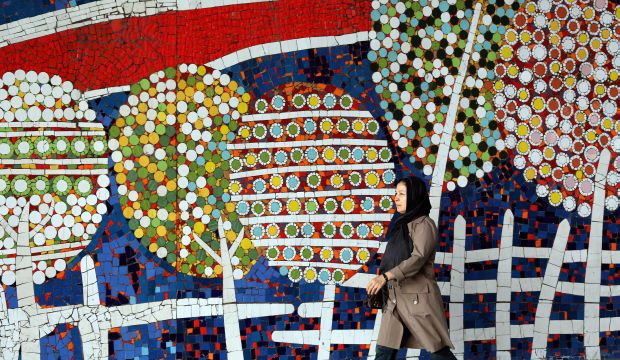
An Iranian woman walks past a mural on a street in the northwest of the capital Tehran, on October 19, 2015. (AFP PHOTO / ATTA KENARE)
The word “ashik” means “lover” in Persian. But in this context it refers to troubadours who travelled from city to city to tell stories, sing songs, recite their poems and play a variety of string instruments, notably the sitar. “Our business is a mixture of two things,” the Ashik liked to say, “the saz (the string instrument) and the souz (the pain of love).”
There are many different theories regarding the origins of the Ashik tradition. One such theory traces those origins to Central Asia where itinerant musicians were part of the culture of many Altaic peoples from Mongolia to the Caspian Sea. According to another theory, the Ashiks emerged from the Irano-Islamic tradition of “Javanmardi” (Futuwwah) which idealized chivalry and the concept of distant love.
What is certain, however, is that the Ashik tradition has deep roots in Sufism, especially the versions that were popular in Azerbaijan and neighboring provinces, some of them no longer part of Iran, such as Armenia, Nakhichevan, Georgia, Dagestan, Tajikistan and, of course, the Kurdish parts of Iraq and Syria.
The Ashik art was also popularized in Russia in the 19th century thanks to Mikhail Lermontov’s epic poem “Ashik Gharib “ (The vagabond Lover) in which love is depicted as the sole path to human perfection, if not actual sainthood. Lermontov’s epic was turned by Sergei Parajanov into a film in the 1930s.
Ghorbani was born in the Abbas-Abad village of the Qara-Dagh (Black Mountain) region and became a student of several famous Ashiks, including Heydar, Khair-Allah and Aziz Shahnazi from 1949 onwards. By 1964 he had established enough of a reputation to be invited to perform in radio and TV networks in Tabriz, his hometown, and Tehran.
Ashik Rasoul soon found an international audience as well, performing in numerous foreign lands including France, Germany, Holland, United Kingdom, Japan, China, Austria and Russia. With its independence from the USSR in 1991, the former Soviet republic of Azerbaijan also became a major stage for Ghorbani’s art.
Ghorbani’s musical and poetic rendition of folk tales with heroes, such as Shah Ismail, the founder of the Safavid Dynasty, and Koroghlu, a kind of Azeri Robin Hood, have been part of the top-selling charts in their category for years.
[divider]
Here is the translation of two poems by Ashik Rasoul:
The Cup
The pious urge me to give you up
To fall in line and break the cup
But it’s with you, a cup in hand
That the lover feels he’s on top
The pious know not, if I leave you
The sun will vanish, the earth’ll drop.
Apple
Why is the apple best of all fruits?
Half of it the face of lover, half the face of beloved
The yellow half is surely my face
And, the red half that of beloved.
